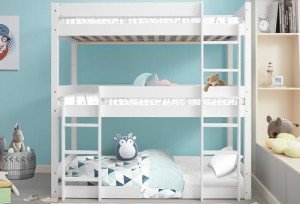20 Things Only The Most Devoted Bunk Beds Sale Fans Should Know
Bunk Beds Sale: A Comprehensive Guide to Choosing the Right Bunk Bed for Your Home
Bunk beds have long been a staple in children's bed rooms, using a mix of space-saving effectiveness and fun. Whether accommodating brother or sisters, friends on slumber parties, or merely taking full advantage of a playroom, bunk beds have actually become an important aspect in contemporary household homes. As sales on bunk beds rise, it ends up being significantly vital for customers to make informed decisions when buying one. This post will cover the fundamentals of purchasing a bunk bed, from types to safety features, in addition to ideas for preserving the integrity of your investment.
Kinds Of Bunk Beds
When considering a bunk bed sale, it's crucial to comprehend the various styles readily available on the market. Below are the most typical types:
Traditional Bunk Beds: These consist of 2 beds stacked one above the other, sharing a single frame. They are often the most economical choice.
L-Shaped Bunk Beds: This design features one bed positioned vertically and another horizontally. This plan creates extra space below the upper bed, which can be utilized for storage or a backyard.
Lofted Beds: Similar to conventional bunk beds but without any lower bed. Rather, the space beneath can be used for a desk, play area, or additional storage.
Triple Bunk Beds: For households with a bigger variety of children or frequent sleepovers, triple bunk beds supply 3 sleeping locations in a space-efficient design.
Futon Bunk Beds: These designs merge bunk beds and futon couches. The bottom area converts into a separate seating location, boosting performance.
Convertible Bunk Beds: These beds can be separated into 2 individual beds, making them versatile as kids's needs alter with time.
Table 1: Comparison of Bunk Bed Types
Type
Description
Space Efficiency
Additional Features
Conventional Bunk Bed
Two beds stacked vertically
High
Most basic style
L-Shaped Bunk Bed
One vertical and one horizontal bed
Moderate
Play or storage space
Lofted Bed
Raised bed with open space below
High
Work/play area
Triple Bunk Bed
3 stacked beds
Really High
Accommodates more users
Futon Bunk Bed
Bunk bed with a convertible futon
High
Multi-functional
Convertible Bunk Bed
Can be split into two separate beds
Moderate
Versatility & & durability
Safety Features to Consider
Safety is vital when purchasing a bunk bed. Below are crucial safety features to look for:
Guardrails: Adequate guardrails should exist on both sides of the upper bunk to prevent falls. They ought to be at least 5 inches higher than the bed mattress.
Ladder Design: Look for strong, wide ladders with slip-resistant rungs. Make sure that the angle is not too steep for easy gain access to.
Stability: Ensure the bed is constructed with strong products, such as strong wood or sturdy metal. The bed ought to not wobble when in usage.
Weight Limit: Check the weight capability of the bunk bed to ensure it can accommodate the designated users safely.
Product Safety: If possible, select beds made from non-toxic products or those fulfilling safety requirements for kids's furnishings.
Table 2: Essential Safety Features
Function
Description
Significance
Guardrails
Sides of upper bed to avoid falls
Necessary for child security
Ladder Design
Strong, slip-resistant rungs
Help safe and simple gain access to
Stability
Develop quality to prevent wobbling
Ensures security and durability
Weight Limit
Maximum weight capacity
Avoids mishaps
Product Safety
Non-toxic, safe materials
Secures kids's health
Maintenance Tips for Bunk Beds
To extend the life of your bunk bed and ensure ongoing safety, consider the following upkeep suggestions:
Regular Inspections: Periodically examine the structure for loose screws, bolts, or any indications of wear. Tighten up fasteners as necessary.
Clean Periodically: Dust and tidy the surfaces regularly. Use Best Bunk Bed jaylaani.top that will not harm the finish.
Examine Weight Limits: Be mindful of weight limits, especially with older children or adults who may want to utilize the upper bunk.
Prevent Climbing on Guardrails: Educate kids not to use guardrails for climbing up or playing to minimize the risk of mishaps.
Frequently Asked Questions (FAQs)
Q1: What is the age limit for children to safely utilize bunk beds?A: While it varies by the maker, many advise that kids under 6 must not oversleep the upper bunk due to security concerns.
Q2: How can moms and dads prevent hazardous climbing?A: Setting clear guidelines about bunk bed use and supervising children can assist. In addition, using a bed camping tent can discourage climbing while developing an enjoyable sleep environment.
Q3: What should I think about when decorating a space with bunk beds?A: Ensure there is adequate space around the bunk bed for safe motion, and use the decor to produce individualized spaces for each child.
Q4: Is a lofted bed suitable for older children?A: Yes, lofted beds can be ideal for older children as long as they satisfy safety requirements and the child is accountable enough to use them securely.
Bunk beds serve a functional function while including an element of enjoyable to a kid's bedroom. As sales of bunk beds continue to increase, careful consideration of types, security functions, and maintenance practices is necessary for moms and dads and caretakers. By comprehending these essential factors, families can discover the ideal bunk bed for their home, guaranteeing both practicality and safety for several years to come. Whether it's for siblings sharing a space or producing a comfortable slumber party space, a well-chosen bunk bed can supply pleasure and usefulness, making it a worthy financial investment.
